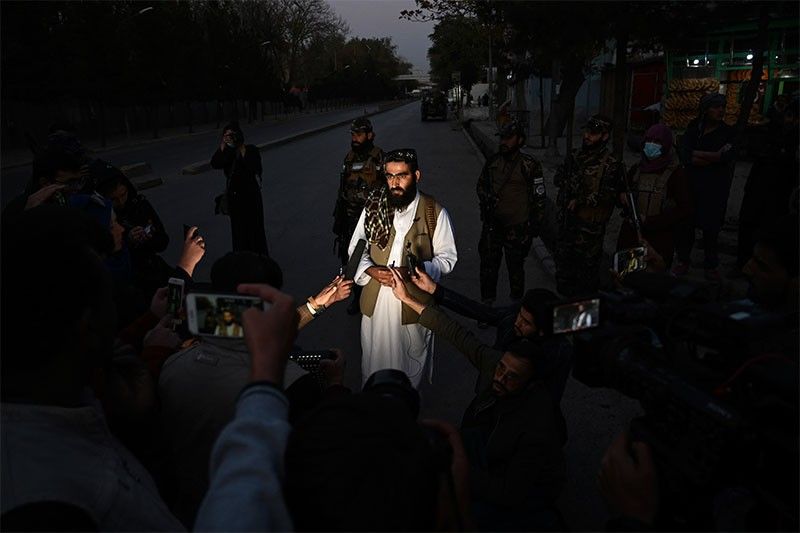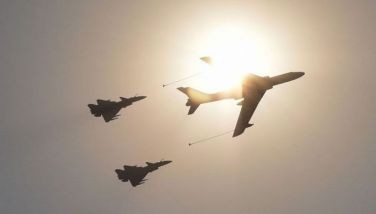19 dead in IS suicide attack on Kabul military hospital

KABUL, Afghanistan — At least 19 people were killed and 50 more wounded in an attack on a military hospital in Kabul on Tuesday, the latest atrocity to rock Afghanistan since the Taliban seized power.
The Taliban's rivals, the Islamic State group, claimed responsibility for the gun and bomb assault in the centre of the capital.
Islamic State-Khorasan (IS-K) said in a statement on its Telegram channels that "five Islamic State group fighters carried out simultaneous coordinated attacks" on the sprawling site.
"The IS insurgents wanted to target civilians, doctors and patients in the hospital," Taliban spokesman Zabiullah Mujahid said, claiming that Taliban forces had repulsed the attack within 15 minutes.
As part of the response, he said, Taliban "special forces" were dropped onto the roof of the hospital from one of the helicopters that the group seized from Afghanistan's former US-backed government.
The attack got under way when a suicide bomber detonated his explosives near the facility's entrance. Gunmen then broke into the hospital grounds, firing their weapons.
"Nineteen dead bodies and about 50 wounded people have been taken to hospitals in Kabul," a health ministry official who asked not to be named told AFP.
Mujahid played down the death toll, but confirmed that two Taliban fighters, two women and a child had been killed outside the hospital.
One woman who had been trapped in the hospital when the attack began told AFP how she and her friend "felt we were going to die, that our lives were ending".
"There was a blast at the door," Rowana Dawari, a poet and lecturer, told AFP.
"Daesh came and started firing, we were stuck. We heard firing, glass breaking. We locked ourselves in a bathroom," she said, referring to IS by its local name.
"Later, Taliban came and we saw they were with our doctors, so we knew it was OK."
Amanudhin, a 28-year-old cleaner at the hospital, pushed an elderly, frail and partially sighted patient, Mariam, away from the scene in a wheelchair.
"The explosion happened and after a while people started screaming 'Daesh is here'," he told AFP. "We heard a lot of firing.
"We were in the 7th floor and locked ourselves in a room. There were injured people everywhere. Broken glass."
They hid until Taliban fighters came to rescue them: "They were special forces, professionals, they broke the door and got inside."
Going 'room to room'
The Taliban spent 20 years waging an insurgency against the ousted US-backed government.
Now they face the struggle of bringing stability to Afghanistan, which has been hit in recent weeks by a series of bloody assaults claimed by the Islamic State group's local chapter.
"All the attackers are dead. The attack was initiated by a suicide bomber on a motorcycle who blew himself up at the entrance of the hospital," a Taliban official from the government media team said.
Two explosions targeted the hospital area, he had earlier said in a statement.
AFP staff in the city heard a second explosion some 30 minutes after the first was reported.
"I heard a big explosion coming from the first checkpoint. We were told to go to safe rooms. I also hear guns firing," a doctor at the Sardar Mohammad Daud Khan hospital told AFP while the attack was being carried out.
"I can still hear gun firing inside the hospital building. I think the attackers are going from room to room... like the first time it was attacked," the doctor added.
Ambulances speeding through Kabul
The hospital, which treats wounded soldiers from both the Taliban and former Afghan security forces, was previously attacked in 2017, when gunmen disguised as medical personnel killed at least 30 people in an hours-long siege.
Although both IS and the Taliban are hardline Sunni Islamist militants, they differ on details of religion and strategy.
IS have claimed four mass casualty attacks since the Taliban takeover on August 15, including suicide bomb blasts targeting Shiite Muslim mosques. The group regards Shiite Muslims as heretics.
The 2017 attack was also claimed by the Islamic State group, and the Taliban denied responsibility.
Pictures shared on social media on Tuesday showed black smoke billowing into the air after the explosions, the first of which went off at around 1:00 pm (0830 GMT).
Roads close to the heavily fortified "Green Zone" where the buildings of several former Western embassies were located were closed off to traffic and Taliban guards scaled up searches.
The US State Department condemned the attack, spokesman Ned Price said in a tweet Tuesday evening.
"We mourn those killed and offer our condolences to their loved ones," he said. "Targeting medical professionals and patients is abhorrent and has no justification."
Get the latest news as Taliban gains control of Afghanistan. Photo courtesy of Al Jazeera/AFP
Afghanistan's supreme leader said Sunday the country's women were being saved from "traditional oppressions" by the adoption of Islamic governance and their status as "free and dignified human beings" restored.
In a statement marking this week's Eid al-Adha holiday, Hibatullah Akhundzada -- who rarely appears in public and rules by decree from the Taliban's birthplace in Kandahar -- said steps had been taken to provide women with a "comfortable and prosperous life according to Islamic Sharia".
The United Nations expressed "deep concern" last week that women were being deprived of their rights under Afghanistan's Taliban government and warned of systematic gender apartheid.
Since returning to power in August 2021, Taliban authorities have stopped girls and women from attending high school or university, banned them from parks, gyms and public baths, and ordered them to cover up when leaving home.
They have also barred them from working for the UN or NGOs, while most female government employees have been dismissed from their jobs or are being paid to stay at home.
However, Akhundzada said "necessary steps have been taken for the betterment of women as half of the society".
"All institutions have been obliged to help women in securing marriage, inheritance and other rights," his statement read. — AFP
UN chief Antonio Guterres will gather international envoys at a secret location in Doha on Monday in an increasingly desperate bid to find ways to influence Afghanistan's Taliban rulers. — AFP
The UN Security Council adopted a resolution Thursday calling on Taliban authorities to "swiftly reverse" all restrictive measures against women, condemning in particular its ban on Afghan women working for the United Nations.
The resolution, unanimously adopted by all 15 Council members, said the ban announced in early April "undermines human rights and humanitarian principles."
More broadly, the Council called on the Taliban government to "swiftly reverse the policies and practices that restrict the enjoyment by women and girls of their human rights and fundamental freedoms."
It cited access to education, employment, freedom of movement, and "women's full, equal and meaningful participation in public life."
The Council also urged "all States and organizations to use their influence" to "promote an urgent reversal of these policies and practices." — AFP
G7 foreign ministers on Tuesday demanded the "immediate reversal" of a ban on women in Afghanistan working for non-governmental organisations and the United Nations.
"We call for the immediate reversal of unacceptable decisions restricting human rights and fundamental freedoms, including the latest bans prohibiting Afghan women from working for NGOs and the UN," the top diplomats said in a statement after two days of talks in Japan.
The group also slammed the Taliban authorities' "systematic abuses of human rights of women and girls and discrimination against the members of religious and ethnic minorities".
Taliban authorities triggered international outrage this month after extending a December ban on Afghan women working for non-governmental organisations to include the UN.
They have rejected criticism over the move, saying it is an internal issue that should be "respected by all sides." — AFP
The United Nations is being forced to make an "appalling choice" over whether to continue operations in Afghanistan while the Taliban government bans women from working for the organisation, the world body says.
Under their austere interpretation of Islam, Taliban authorities have imposed a slew of restrictions on Afghan women since seizing power in 2021, including banning them from higher education and many government jobs.
In December, they banned Afghan women from working for domestic and foreign non-governmental organisations, and on April 4 extended that to UN offices across the country.
In a statement Tuesday, the UN mission in Afghanistan said the ban was "unlawful under international law, including the UN Charter, and for that reason the United Nations cannot comply".
"Through this ban, the Taliban de facto authorities seek to force the United Nations into having to make an appalling choice between staying and delivering in support of the Afghan people and standing by the norms and principles we are duty-bound to uphold," it said. — AFP
- Latest
- Trending




























